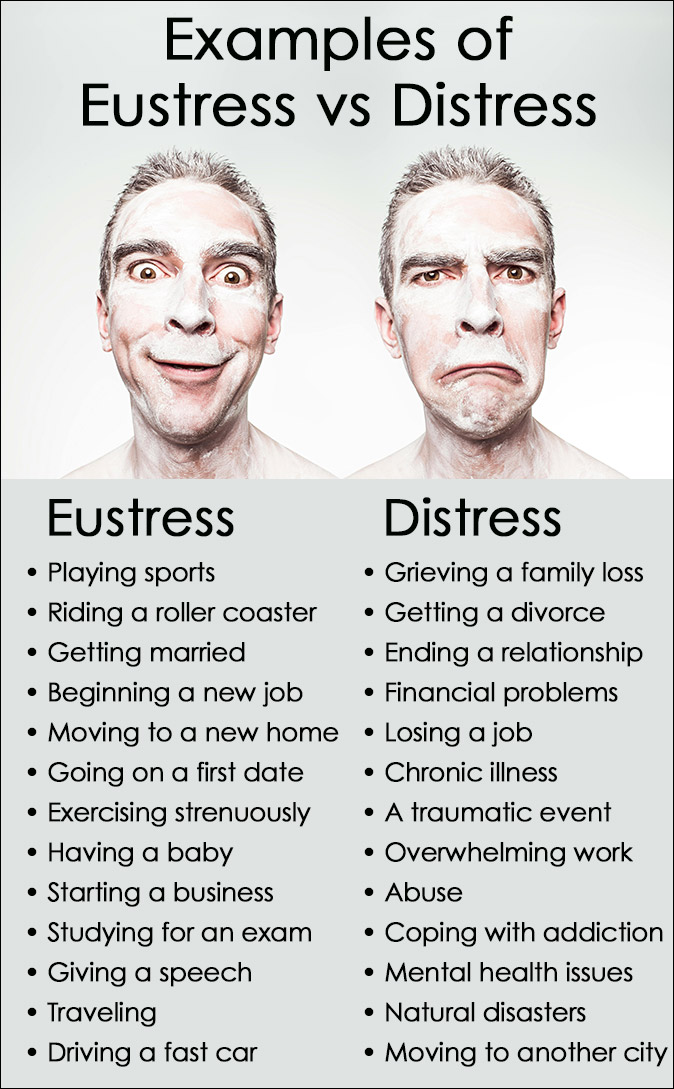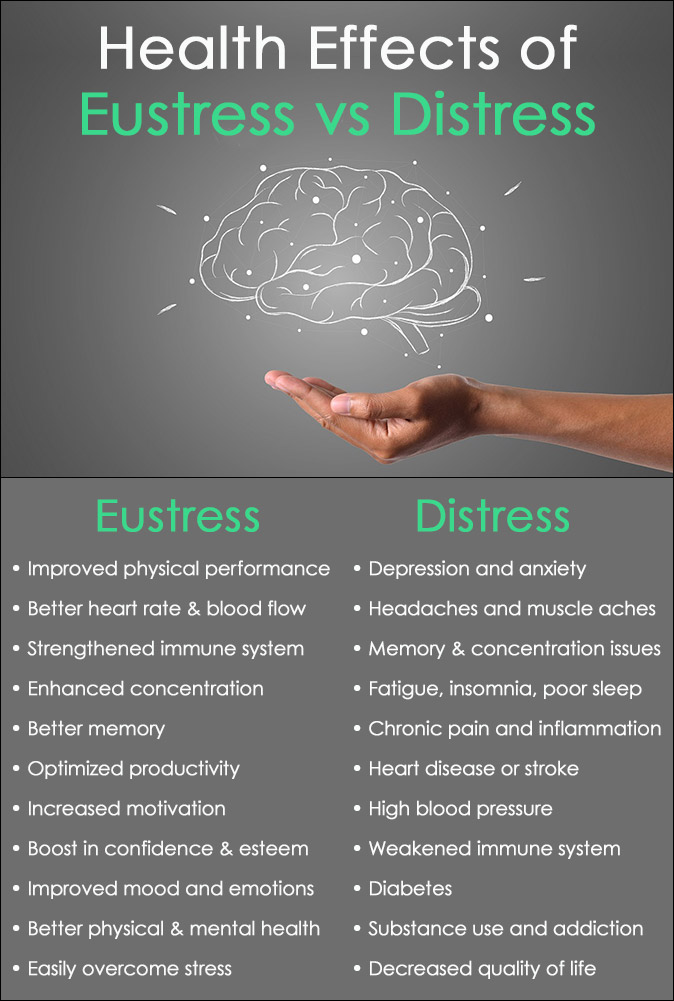
We all experience stress, but there are different types and not all of them are bad. Being able to recognize the difference between eustress vs distress is helpful for understanding how to make the most of each emotional state.
Eustress is a positive stress response that can lead to a healthy emotional state, while distress is a negative stress response that can have an adverse effect on physical and mental health.
The brain’s natural stress response releases hormones as a defense mechanism intended to keep us safe. But the degree and reason behind the release of the hormones will have an impact on how we perceive and handle a situation when it occurs.
Cortisol is known as the “stress hormone” and it is released when we experience stress. High levels can be detrimental to our health, so learning how to decrease cortisol levels naturally can help reduce the impact of distress.
It should be mentioned that not all hormones are unhealthy. A happiness hormone like dopamine is associated with pleasure and the brain’s reward system to help us feel joy.
Tapping into happy hormones and avoiding stress-related ones can mean the difference between experiencing eustress vs distress.
What is Eustress?
Eustress is a positive form of stress and is referred to as “good stress” because it excites and motivates us to do something.
It is a healthy form of stress that can be physically and mentally beneficial for the body and mind.
Jumping out of an airplane with a parachute strapped to your back is a perfect example of eustress. It can be scary and stressful while at the same time exhilarating. These feelings only last a short time and can leave a person feeling motivated to do it again.
The Cambridge Dictionary lists the eustress definition as “stress that is not too extreme and is good for someone,” meaning eustress is positive stress, that comes from beneficial challenges or exciting experiences.
In 1976, Hans Selye combined the Greek word “eu,” which means “good,” with “stress,” to form the word eustress, hence the term “good stress.”
Eustress is typically a short-term emotional state that gives us a boost of motivation when we need to perform at a higher level to accomplish a goal.
Features of Eustress
- Only lasts a short time
- Improves focus
- Enhances performance
- Associated with positive emotions
- Challenging but manageable
- Motivates and excites
- Falls within our abilities
- Promotes achievement and growth
When a person experiences eustress, it excites and motivates them to overcome challenges and achieve goals outside of their comfort zone.
What is Distress?
Distress is a negative form of stress that is the condition we normally think of when we are stressed out.
This type of stress occurs when we feel threatened, scared, overwhelmed, or unable to deal with a situation that is beyond our control.
Grieving the death of a parent is an example of distress. It can leave a person feeling overwhelmed and makes it difficult to focus, sleep, or cope with the situation. This type of stress can last a long time, but not always.
The Merriam-Webster dictionary cites the definition of distress as, “pain or suffering affecting the body, a bodily part, or the mind.”
Distress can be short-lived or last a long a time, and if not addressed may lead to various types of anxiety disorders or depression.
Severe or chronic distress can have a negative impact on physical and mental health.
Signs of Eustress
- Short or long-term duration
- Feeling overwhelmed
- Unable to cope with the situation
- Decreased focus
- Reduced performance
- Increased anxiety and irritability
- Fatigue
- Difficulty sleeping
- Hopelessness

Examples of Eustress vs Distress
When examining examples of eustress vs distress, it’s possible to notice some similarities or overlap between them.
Keep in mind the feelings experienced with eustress are mostly positive and short-term, distress are generally negative and can last a long or short time.
Eustress Examples
- Playing sports
- Riding a roller coaster or thrill ride
- Getting married
- Beginning a new job
- Moving into a new house
- Going on a first date
- Exercising strenuously
- Having a baby
- Starting a business
- Studying for a school exam
- Planning a big work project
- Giving a speech
- Traveling to a different country
- Learning a new skill
- Driving a fast car
All of these situations involve some form of stress, but it is usually mild and only lasts a short time.
Eustress provides a boost of hormones to increase focus, concentration, physical stamina, and creativity to achieve success.
Examples of Distress
- Grieving the loss of family or friends
- Getting a divorce
- Ending a romantic relationship
- Financial problems
- Quitting or losing a job
- Chronic injury or illness
- Experiencing a traumatic event
- Overwhelming schoolwork
- Physical or emotional abuse
- Coping with addiction
- Mental health issues
- Natural disasters
- Moving to another city
These examples of distress are more severe and overwhelming than the ones listed for eustress, and the stressful feelings often last much longer.
The Effects of Eustress vs Distress on Physical and Mental Health
The effects of eustress vs distress on a person’s physical and mental health will vary depending on the severity of the stress they are experiencing, the duration, the causes, and even the end result.
The after-effect of eustress is often a positive outcome, while distress is usually negative. Chronic distress will create the most serious health complications.
Effects of Eustress on Health
- Improved physical performance related to sports
- Increased heart rate and blood flow
- Strengthened immune system
- Enhanced focus and concentration
- Better memory
- Optimized productivity
- Increased motivation
- Boost in confidence and self-esteem
- Improved mood and positive emotions
- Heightened physical and mental health
- Better able to overcome stressful situations
Effects of Distress on Health
- Depression and anxiety
- Headaches and muscle aches
- Memory and concentration issues
- Fatigue
- Insomnia or difficulty sleeping
- Chronic pain
- Inflammation
- Heart disease
- High blood pressure
- Possibility of stroke
- Eating and digestive issues
- Weakened immune system
- Diabetes
- Substance use and addiction
- Decreased quality of life

Strategies to Improve Eustress vs Distress
It is nearly impossible to avoid all forms of stress, but there are ways to reduce bad distress and promote good eustress.
It can take time to find a healthy balance, but it is ultimately worth the effort. Here are some tips to help get started.
Ways to Reduce Distress
- Exercise regularly
- Get outside and soak up some sun
- Add yoga to your daily routine
- Eat healthy and nutritious food
- Get proper and restful sleep each night
- Practice meditation and mindfulness
- Limit caffeine intake
- Avoid or reduce alcohol consumption
- Learn to identify stressors and triggers
- Set boundaries and don’t overcommit
- Cultivate a strong social support network
- Consider exploring low stress jobs
- Practice self care
- Set realistic goals
- Schedule time to relax
- Ask for help if you feel overwhelmed
- Seek professional help when necessary
Ways to Promote Eustress
- Create smart goals that are challenging and achievable
- Try new things outside of your comfort zone
- Travel and explore new places
- Adopt a new hobby
- Spend time with family and friends
- Practice gratitude
- Volunteer and always pay it forward
- Learn a new skill or language
- Play sports
- Find growth opportunities at work
- Teach others new skills
- Learn from failure
- Celebrate your achievements
Identifying and understanding the differences between eustress vs distress is necessary for avoiding bad stress and incorporating good stress into our daily lives.
Reducing distress and promoting eustress not only improves physical and mental health, but it also increases motivation and resilience.
Eustress vs Distress FAQs
How can I tell the difference between eustress vs distress?
Eustress:
- Usually short-term
- Challenging but manageable
- Improves performance and motivates goal achievement
- Within your coping abilities
- Leads to excitement, satisfaction, and accomplishment
- Enhances physical and mental well-being
Distress:
- Can be short-term (acute) or long-term (chronic)
- Feels overwhelming
- Decreases performance and focus
- Outside your coping abilities
- Feels uncontrollable and uncomfortable
- Leads to anxiety and worry
Can eustress and distress lead to anxiety disorders?
Eustress usually does not lead to anxiety disorders, and it has a positive effect on increasing motivation and focus, improving confidence, and can provide a sense of accomplishment.
Chronic distress and long-term feelings of being overwhelmed from stress can lead to anxiety disorders over time if not managed or treated.
Can chronic distress lead to depression?
Yes, there is a clear connection between stress and depression and each one can cause the other if the symptoms are not addressed.
Prolonged distress can cause changes in the structure and function of the brain related to neurotransmitters, mood, and mental health.
It can also cause sleep problems, immune system dysfunction, social isolation, and unhealthy coping mechanisms like alcohol and substance use, all of which increase the risk of depression.
Are eustress and distress connected to the fight or flight response?
Yes, both eustress and distress activate the sympathetic nervous system, which is connected to the fight-or-flight response. But they usually trigger it in distinct ways and result in different outcomes.
A Eustress response is manageable and potentially beneficial, which often leads to positive outcomes.
Distress is more intense and overwhelming, so it can be harmful and lead to negative health outcomes if not addressed and successfully managed.
What hormones are released during eustress vs distress?
Any type of stress response releases hormones such as Epinephrine (adrenaline), Norepinephrine, and Cortisol.
The main difference between hormone release in eustress vs distress is that they are usually activated in smaller doses and for a shorter duration during eustress and the body returns to homeostasis more quickly.
Distress hormone activation is much more intense for a longer period of time than with eustress, which is one reason why it has negative health implications.
Related Posts
- Stressed Out? What are Stress vs Anxiety Symptoms
Are you stressed out not knowing wether you're suffering from Anxiety or Stress? Though they…
- Stress Awareness Month in April and Types of Stress
April is Stress Awareness Month and it’s a good time for all of us to…
- CBT vs DBT Are Similar Yet Different Therapies
Behavioral therapies, like CBT vs DBT, are terms that sound more intimidating than they are…
